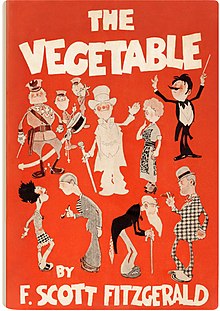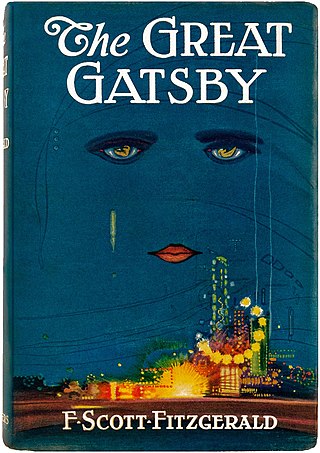
The Great Gatsby is a 1925 novel by American writer F. Scott Fitzgerald. Set in the Jazz Age on Long Island, near New York City, the novel depicts first-person narrator Nick Carraway's interactions with Jay Gatsby, the mysterious millionaire with an obsession to reunite with his former lover, Daisy Buchanan.

Zelda Fitzgerald was an American novelist, painter, and socialite. Born in Montgomery, Alabama, to a wealthy Southern family, she became locally famous for her beauty and high spirits. In 1920, she married writer F. Scott Fitzgerald after the popular success of his debut novel, This Side of Paradise. The novel catapulted the young couple into the public eye, and she became known in the national press as the first American flapper. Because of their wild antics and incessant partying, she and her husband became regarded in the newspapers as the enfants terribles of the Jazz Age. Alleged infidelity and bitter recriminations soon undermined their marriage. After Zelda traveled abroad to Europe, her mental health deteriorated, and she had suicidal and homicidal tendencies, which required psychiatric care. Her doctors diagnosed her with schizophrenia, although later posthumous diagnoses posit bipolar disorder.

Frances Scott "Scottie" Fitzgerald was an American writer and journalist and the only child of novelist F. Scott Fitzgerald and Zelda Sayre Fitzgerald. She matriculated from Vassar College and worked for The Washington Post, The New Yorker, and other publications. She became a prominent member of the Democratic Party.

William Maxwell Evarts "Max" Perkins was an American book editor, best remembered for discovering authors Ernest Hemingway, F. Scott Fitzgerald, Marjorie Kinnan Rawlings, and Thomas Wolfe.
Matthew Joseph Bruccoli was an American professor of English at the University of South Carolina. He was an expert on F. Scott Fitzgerald; his biography of Fitzgerald, published in 1981, was considered the standard biography for decades. He also wrote about other writers, including Ernest Hemingway, Thomas Wolfe, and John O'Hara, and was editor of the Dictionary of Literary Biography.

Save Me the Waltz is a 1932 novel by American writer Zelda Fitzgerald. The novel's plot follows the privileged life of Alabama Beggs, a Southern belle who grows up the Deep South during the Jim Crow era and marries David Knight, an aspiring painter. After engaging in a carefree life of hedonistic excess during the riotous Jazz Age, an aging Alabama aspires to be a prima ballerina, but an infected blister from her pointe shoe leads to blood poisoning and ends her dream of fame. Much of the semi-autobiographical plot reflects Zelda Fitzgerald's own life and her marriage to writer F. Scott Fitzgerald.

This Side of Paradise is a 1920 debut novel by American writer F. Scott Fitzgerald. It examines the lives and morality of carefree American youth at the dawn of the Jazz Age. Its protagonist, Amory Blaine, is a handsome middle-class student at Princeton University who dabbles in literature and engages in a series of unfulfilling romances with young women. The novel explores themes of love warped by greed and social ambition. Fitzgerald, who took inspiration for the title from a line in Rupert Brooke's poem Tiare Tahiti, spent years revising the novel before Charles Scribner's Sons accepted it for publication.

The Beautiful and Damned is a 1922 novel by American writer F. Scott Fitzgerald. Set in New York City, the novel's plot follows a young artist Anthony Patch and his flapper wife Gloria Gilbert who become "wrecked on the shoals of dissipation" while partying to excess at the dawn of the hedonistic Jazz Age. As Fitzgerald's second novel, the work focuses on the swinish behavior and glittering excesses of the American idle rich in the heyday of New York's café society.

The Short Stories of F. Scott Fitzgerald is a compilation of 43 short stories by F. Scott Fitzgerald. It was edited by Matthew J. Bruccoli and published by Charles Scribner's Sons in 1989. It begins with a foreword by Charles Scribner II and a preface written by Bruccoli, after which the stories follow in chronological order of publication.

Flappers and Philosophers is a collection of eight short stories by American writer F. Scott Fitzgerald, published in 1920 by Charles Scribner's Sons. Each of the stories had originally appeared, independently, in either The Saturday Evening Post,Scribner's Magazine, or The Smart Set.
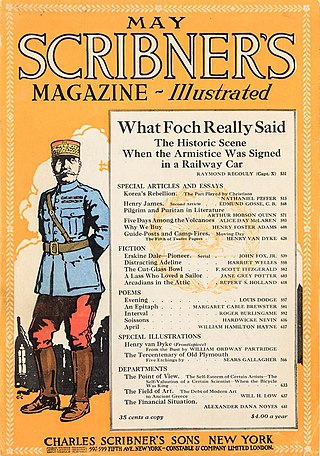
"The Cut-Glass Bowl" is a short story by American author F. Scott Fitzgerald, first published in the May 1920 issue of Scribner's Magazine, and included later that year in his first short story collection Flappers and Philosophers. The story follows the lives of a married couple, Evylyn and Harold Piper, through various difficult or tragic events that involve a cut glass bowl they received as a wedding gift. In a copy of Flappers and Philosophers which he gave to literary critic H. L. Mencken, Fitzgerald wrote that he deemed the story to be "worth reading" in contrast to others in the volume which he dismissed as either "amusing" or "trash."

"Winter Dreams" is a short story by F. Scott Fitzgerald first published in Metropolitan magazine in December 1922 and collected in All the Sad Young Men in 1926. The plot concerns the attempts by a young Midwestern man to win the affection of an upper-class socialite. Frequently anthologized, the story is regarded as one of Fitzgerald's finest works for evoking "the loss of youthful illusions."

"The Ice Palace" is a modernist short story written by F. Scott Fitzgerald and published in The Saturday Evening Post on May 22, 1920. It is one of eight short stories originally published in Fitzgerald's first collection, Flappers and Philosophers, and is also included in the collection Babylon Revisited and Other Stories.
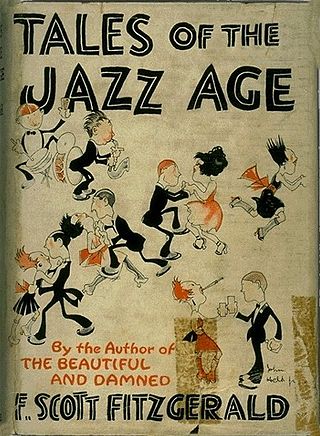
Tales of the Jazz Age (1922) is a collection of 11 short stories by American writer F. Scott Fitzgerald. Divided into three separate parts, it includes one of his better-known short stories, "The Curious Case of Benjamin Button". All of the stories had first appeared, independently, in either Metropolitan Magazine, The Saturday Evening Post, Smart Set, Collier's, the Chicago Sunday Tribune, or Vanity Fair.

Francis Scott Key Fitzgerald, widely known simply as Scott Fitzgerald, was an American novelist, essayist, and short story writer. He is best known for his novels depicting the flamboyance and excess of the Jazz Age, a term he popularized in his short story collection Tales of the Jazz Age. During his lifetime, he published four novels, four story collections, and 164 short stories. Although he achieved temporary popular success and fortune in the 1920s, Fitzgerald received critical acclaim only after his death and is now widely regarded as one of the greatest American writers of the 20th century.

All the Sad Young Men is a collection of short fiction by American writer F. Scott Fitzgerald. The stories originally appeared independently in popular literary journals and were first collected in February 1926 by Charles Scribner's Sons.
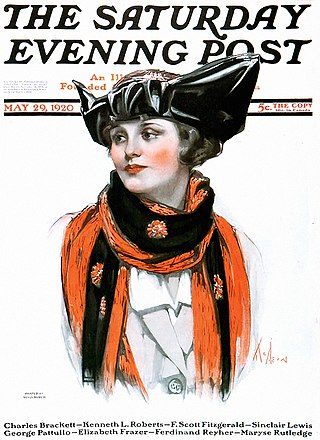
"The Offshore Pirate" is a short story written by F. Scott Fitzgerald in 1920. It is one of eight short stories included in Fitzgerald's first published collection, Flappers and Philosophers. The story was first published in the May 29, 1920 issue of The Saturday Evening Post and illustrated by Leslie L. Benson.
"The Freshest Boy" is a short story by American writer F. Scott Fitzgerald. It was first published in the July 28, 1928 issue of The Saturday Evening Post, and was reprinted in Fitzgerald's 1935 collection, Taps at Reveille.

"The Rich Boy" is a short story by American writer F. Scott Fitzgerald. It was included in his 1926 collection All the Sad Young Men. "The Rich Boy" originally appeared in two parts, in the January and February 1926 issues of Redbook. In the January installment, the story is described on the front cover as: "A great story of today's youth by F. Scott Fitzgerald".
"Echoes of the Jazz Age" is a short essay by American writer F. Scott Fitzgerald that was first published in Scribner's Magazine in November 1931. The essay analyzes the societal conditions in the United States which gave rise to the flowering of youth culture in the raucous historical era known as the Jazz Age and the subsequent events which led to the era's abrupt conclusion. The frequently anthologized essay represents an extended critique by Fitzgerald of 1920s hedonism and is regarded as one of Fitzgerald's finest non-fiction works.
